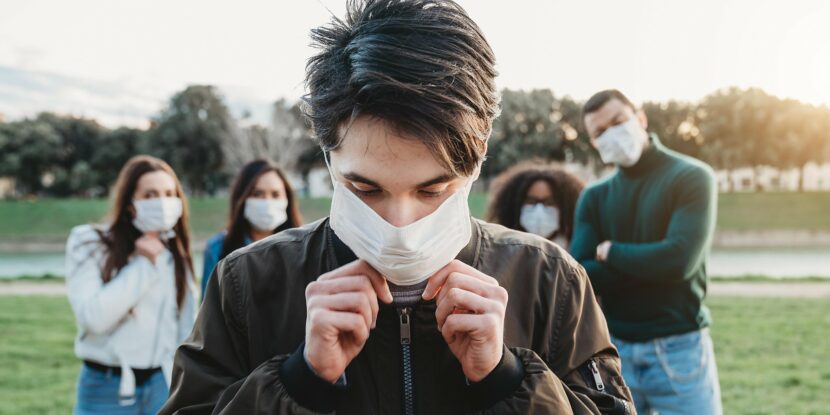Eating disorders among teenage girls increased by over 40 percent during the pandemic, according to a study out of the United Kingdom, with instances of self-harm increasing by almost the same percentage during those two years. The trends were observed among girls aged between 13 and 16 years old, and mirrored in girls between 17 and 19.
The study is yet further evidence that the pandemic, and in particular the social restrictions imposed by governments throughout the world, had terrible and irreversible negative effects on the young at crucial stages in their development – even in the womb.
In November, we reported that tens of millions of Gen-Zers in the US were struggling with mental-health problems. Forty-two percent of Zoomers surveyed said they were suffering from a diagnosed mental-health problem, with 25 percent saying their diagnosis came during the pandemic.
Anxiety, depression, attention-deficit/hyperactivity disorder (ADHD), post-traumatic stress disorder (PTSD) and bulimia were just some of the conditions the respondents reported suffering. By comparison with millennials or Gen X-ers, Zoomers are twice as likely to report struggling with emotional distress on a daily basis.
Nearly 70 percent said they felt the pandemic had a negative effect on their mental health. Zoomers appear to be deeply anxious, with 85 percent expressing a general fear of the future. Nine out of ten Zoomers diagnosed with a mental-health issues exhibit anxiety, while eight out of ten suffer from depression.
Eating disorders and self-harm are clearly linked to depression and anxiety, as the authors of the study of teenage girls note. These external conditions usually signify underlying psychological distress and serve as coping mechanisms. The authors note that possible triggers include isolation, lack of structure to life, and an increased sense of worry.
Using data from over 1800 general practices across the UK, taking in nine million individuals, boys and girls, aged between ten and 24 years old, the researchers compared actual rates of diagnosis of eating disorders and self-harm during the pandemic to trends observed before March 2020. By extrapolating those earlier trends, they were able to create a hypothetical dataset for the two-year period between March 2020 and March 2022 if the pandemic had not happened.
The researchers found 3,862 cases of diagnosed eating disorders and 9,174 diagnosed cases of self-harm among 13 to 16-year-old girls, both of which were significant increases on the projected numbers of 2,713 and 6,631 respectively.
Interestingly, the authors noted there were no observable increases in rates of eating disorders or self-harm among boys, but caution that boys’ struggles with loneliness, depression, and anxiety may well have manifested in other disorders.
The depth of the psychological torment inflicted by the COVID lockdowns has been highlighted by another study which likens their effects on cognition to psychological changes usually observed in prison inmates. Accurate time perception, including recall of events, is believed to require “anchoring” with significant life events, like birthdays and holidays, which were almost totally absent from most people’s lives for a period of two years.
The researchers administered surveys to see whether respondents could accurately place events that took place during the pandemic and events that took place earlier. The results revealed that perception of events that took place during the first year of the pandemic was as fuzzy as perception of events that took place three or four years earlier. What’s more, accuracy of perception was directly linked to the respondents’ mental state, with those who displayed greater signs of depression and anxiety producing less accurate recollections.
“In a landscape, if features are not clearly discernible, it is harder to place objects/yourself in relation to other features,” the authors explain. “Restrictions imposed during the pandemic have impoverished our timescape, affecting the perception of event timelines. We can recall that events happened, we just don’t remember when.”
Making Amends?
The young were among the worst affected by the pandemic, with the harsh social restrictions that prevented them from enjoying the kind of carefree adolescence every child deserves and needs.
With increased focus being thrown on the wrongs of the pandemic response by presidential candidate Robert F. Kennedy Jr. – who has vowed a reckoning with the vaccine manufacturers – now would be a good time for him to focus on the plight of the young and the damage done to an entire generation in the name of preventing the spread of a disease that posed a vanishingly small risk to anybody under the age of 75.
President Trump has now promised a presidential commission to investigate the underlying causes of chronic disease in America, and if that commission takes in depression – as it absolutely should – it will have to reckon with the terrible effects of the pandemic’s social restrictions. Studies have already linked massively increased rates of obesity and weight gain among the young during the pandemic to their unhappiness and lack of opportunities for exercise and socializing with friends.
There can be no doubt that the pandemic will continue to ramify for many years, perhaps even decades, in the blighted lives of our younger generations. The least we can do, besides swearing that future generations will never be subject to such cruel and unusual punishment, is to do our best to give those we betrayed the support and the nourishment they were deprived of for two long years.

